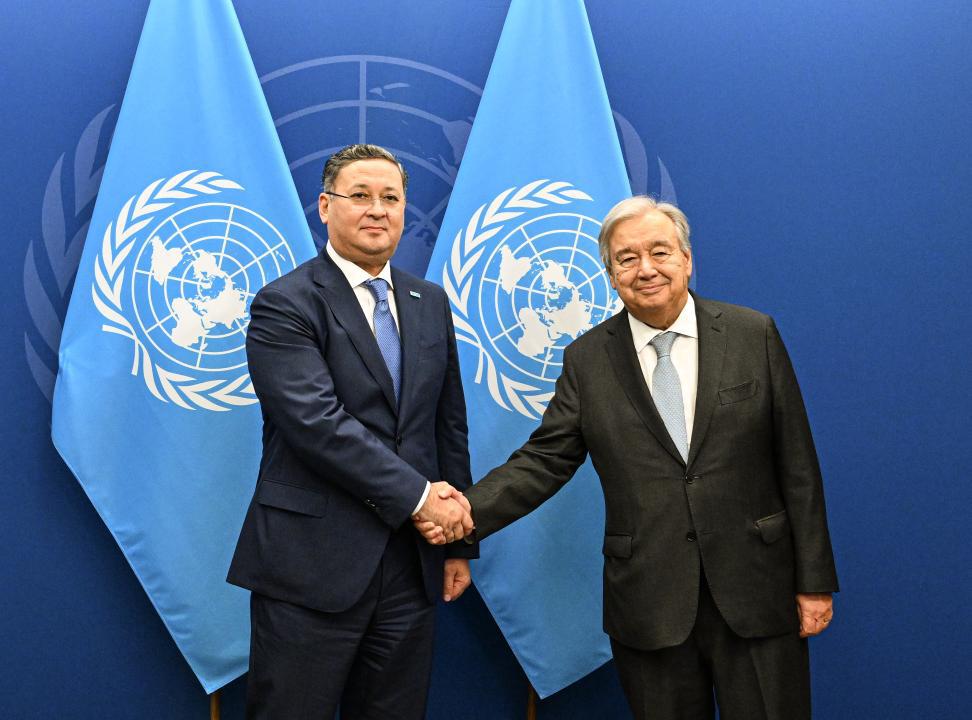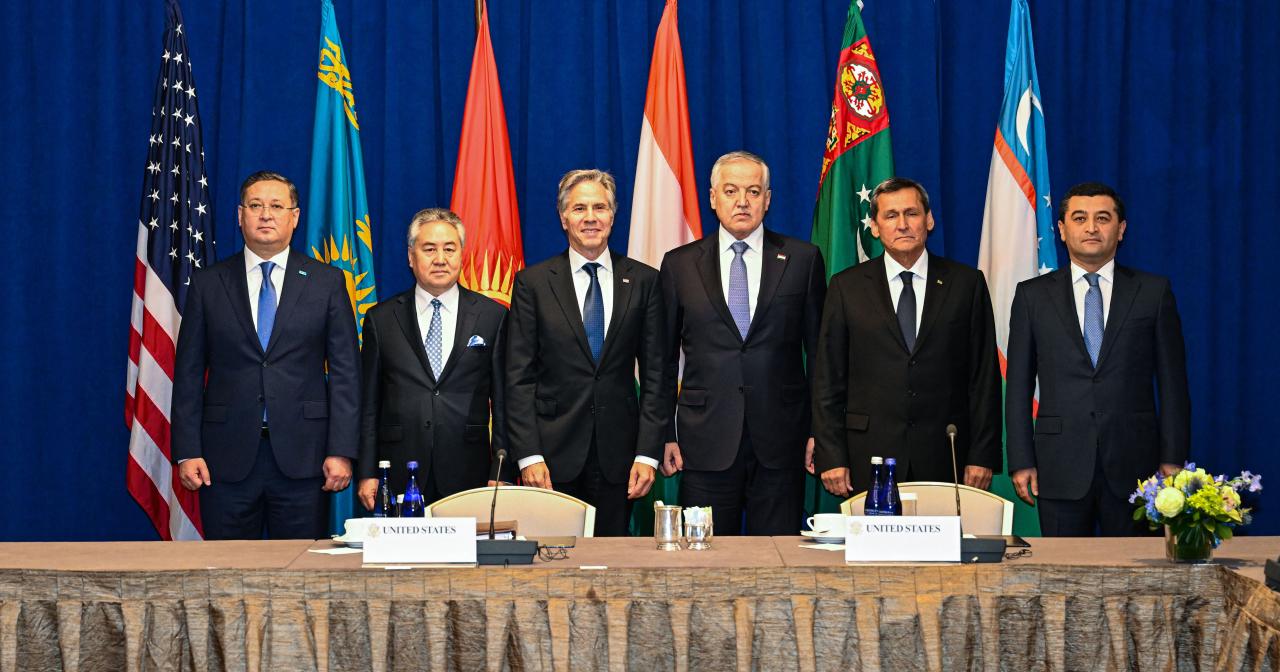ASTANA – Kazakh Deputy Prime Minister and Foreign Minister Murat Nurtleu met with United Nations Secretary-General António Guterres on Sept. 29 at the UN headquarters in New York to discuss cooperation prospects, according to the ministry’s press service.

Kazakh Deputy Prime Minister and Foreign Minister Murat Nurtleu and United Nations Secretary-General António Guterres. Photo credit: gov.kz
The parties spoke about the key issues on the international agenda of the 79th session of the UN General Assembly, as well as the UN’s activities in Kazakhstan and the region. This includes the initiative to establish a UN Regional Center for Sustainable Development for Central Asia and Afghanistan in Almaty.
Nurtleu reaffirmed Kazakhstan’s commitment to the core goals and principles of the UN Charter and expressed the country’s full support for the UN’s efforts to promote global peace and prosperity.
Nurtleu also spoke about Kazakhstan’s foreign policy priorities and the socio-economic and political reforms being implemented in the country, as outlined by President Kassym-Jomart Tokayev in his state-of-the-nation address.

From left to right: Kazakh Deputy Prime Minister and Foreign Minister Murat Nurtleu, Kyrgyz Foreign Minister Zheenbek Kulubaev, the United States Secretary of State Antony Blinken, Tajik Foreign Minister Sirojiddin Mukhriddin, Turkmen Deputy Chairman of the Ministers, Foreign Minister Rashid Meredov and Uzbek Foreign Minister Bakhtiyor Saidov. Photo credit: gov.kz
Guterres praised the strong and strategic partnership between Kazakhstan and the UN. He commended Kazakhstan’s contributions to promoting peace, security, sustainable development, and human rights.
“For us Kazakhstan is a privileged partner, a pillar of multilateralism, a conductor of dialogue between cultures, religions and civilizations. Your country, as a fundamental pillar of Central Asia, is a bridge between East and West,” said Guterres.
“I would like to express my gratitude to your country for its continued support to UN initiatives, in particular for promoting the establishment of the UN Regional Center for Sustainable Development in Central Asia and Afghanistan in Almaty, which I visited in person as part of my participation in the Shanghai Cooperation Organization Summit in July,” he added.
C5+1 Ministerial meeting
Nurtleu also participated in the C5+1 Ministerial meeting during the 79th session of the UN General Assembly, which included United States Secretary of State Antony Blinken, Kyrgyz Foreign Minister Zheenbek Kulubaev, Tajik Foreign Minister Sirojiddin Mukhriddin, Uzbek Foreign Minister Bakhtiyor Saidov, and Turkmen Deputy Chairman of the Ministers, Foreign Minister Rashid Meredov.
During the meeting, Nurtleu shared the Kazakh President’s vision for Central Asia’s role in the global geopolitical landscape, emphasizing the region’s key priorities in addressing both traditional and emerging threats and developing comprehensive response measures.
He also noted the impact of the sixth Consultative Meeting of Central Asian Heads of State in Astana, which strengthened regional integration and economic connectivity.
Nurtleu emphasized Kazakhstan’s political reforms, focused on human capital and noted the importance of holding a C5+1 meeting in Kazakhstan with an emphasis on promoting the rights of people with disabilities.
Secretary Blinken highlighted that 2025 will mark 10 years of U.S.-Central Asia cooperation through the C5+1 platform and reiterated the U.S. commitment to pursuing regional solutions to global challenges in partnership with the countries of the region. The meeting participants underscored the importance of implementing the agreements from the C5+1 Presidential Summit outlined in the New York Declaration. They emphasized the timeliness of launching the B5+1 platform and the Critical Minerals Dialogue, which could drive economic growth.
Diplomatic talks
During the meeting with Rabab Fatima, UN High Representative for Least Developed Countries, Landlocked Developing Countries, and Small Island Developing States, Nurtleu reaffirmed Kazakhstan’s support for landlocked developing countries (LLDCs), mentioning the 2003 UN Conference on LLDCs in Almaty, where the first ten-year Almaty Program of Action was adopted.
Fatima expressed gratitude for Kazakhstan’s contributions to the preparation of the upcoming Third UN Conference on LLDCs, scheduled for December in Gaborone, Botswana.
Nurtleu also held bilateral meetings with Croatian Prime Minister Andrej Plenković and Iranian Foreign Minister Seyed Abbas Araghchi to discuss cooperation prospects and exchange views on regional and global issues.
